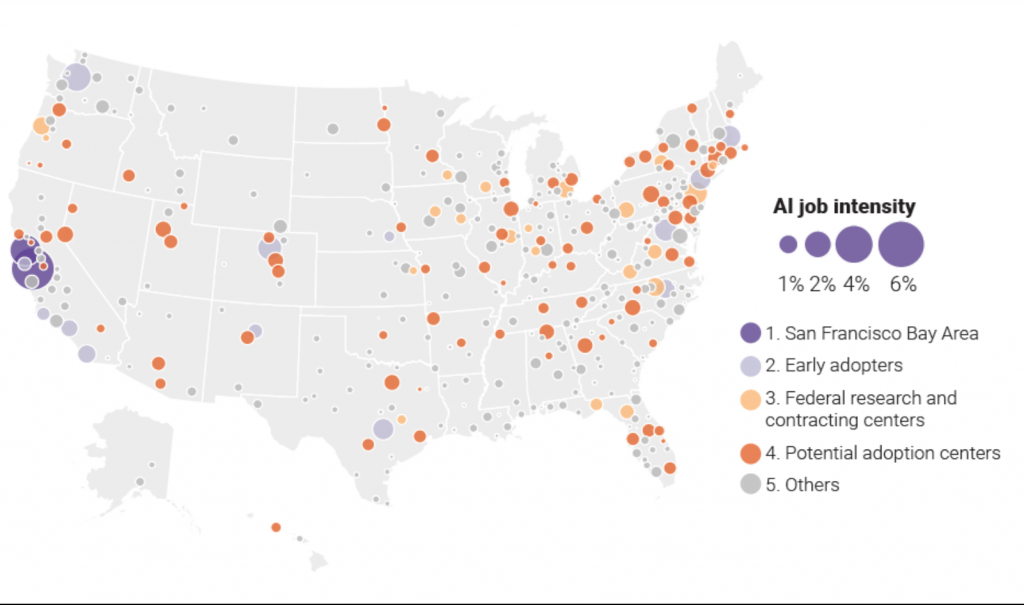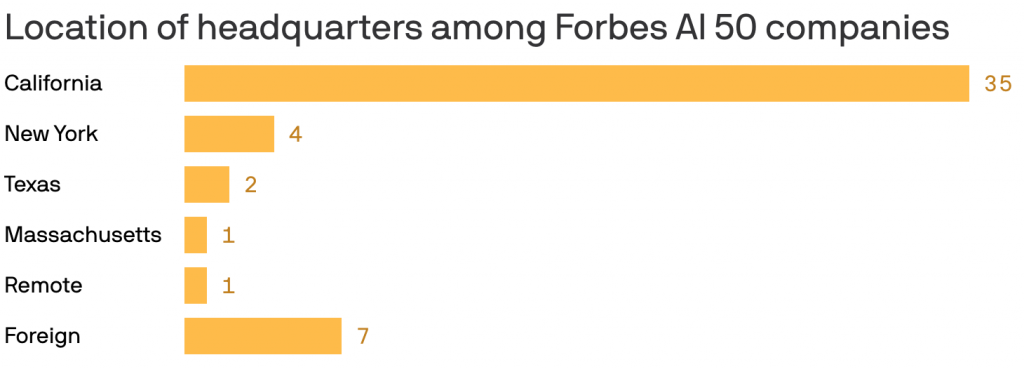
The majority of the top companies on the Forbes AI 50 list are in California. (Source: Brookings analysis of Stanford HAI, Crunchbase, STAR METRICS, USPTO, and Emsi data)
Brookings Report Shows San Francisco Leading the Way in AI Tech Start-Ups
Now that generative AI continues to grow at such a fantastic pace, it’s becoming clear which geographical regions benefit the most from the job growth and influx of capital—and most are in the cities where high-tech businesses already reign supreme.
The winning states are California (35), New York (4), Texas (2), and Massachusetts (1), with one company operating entirely remotely.
None of the top 50 AI startups are in a Rust Belt state, the Midwest, or the South. San Francisco alone is home to 20 of the best-funded AI companies — more than the rest of America combined. Of the companies listed on the Forbes AI 50, 43 are based in the United States. The list was started only five years ago.
On the alternative IVP Enterprise 55 list, San Francisco is the base for 18 out of 55 companies.
Silicon Valley Legacy
It is obvious to most of us that California would have the largest share of AI investments and growth. Califonia’s Silicon Valley is the home of just too many good ideas that translate into billion-dollar companies with investments pouring in. U.S. high-tech industries have become increasingly concentrated in coastal cities in recent decades.
While more than 100 metro areas have the potential to be AI centers, just 14 metro areas account for more than half of AI R&D investment.
Ensuring workers with AI skills are spread across the country is critical to making the CHIPS and Science Act work, Zoë Baird, senior counselor at the U.S. Department of Commerce, told the Aspen
Security Forum, because:
“innovation takes place where manufacturing happens.”
American Chips Delayed
While Arizona did not make the Forbes list of the most popular states for AI, there is a huge project taking place in Phoenix that will deliver some relief to the shortage of chips worldwide. However, there was a delay announced this week.
Hours after Baird’s comments, TSMC, the world’s biggest semiconductor manufacturer, announced it would delay the planned opening of its Arizona plant because of shortages of skilled labor.
TSMC Chairman Mark Liu said the world’s biggest contract chipmaker is entering a critical phase of handling and installing some of the “most advanced equipment” at the plant, its advanced first chip facility in the U.S. in more than 20 years. Mass production was previously slated to begin late next year.
“We are encountering certain challenges, as there is an insufficient amount of skilled workers with the specialized expertise required for equipment installation in a semiconductor-grade facility,” Liu said. He added that TSMC is sending experienced technicians from Taiwan to make up for delays and the lack of trained local workers, confirming a Nikkei Asia report last month.

AI Boom Is Underway
The growth of generative AI might be favoring certain tech centers at the moment, but there is a bigger picture that says the AI boom is spreading to other states. Its early days in generative AI deployment, and wider deployment and adoption across the economy are likely to spread at least some of the economic benefits.
A National Artificial Intelligence Research Institutes program is now operating in 19 cities, helping to build up AI talent pools.
Beyond AI, there is a more widely distributed manufacturing boom underway in the U.S. South and West.
The article from axios.com shines a positive light on this AI surge. They compared the AI boom to the space race. The 1960s “space race” was a classic example of “place-based industrial policy,” with federal investment transforming cities such as Huntsville, Alabama.
It will be interesting to watch how AI creates new centers of opportunity in places that most people probably never dreamed would be possible.
read more at axios.com







Leave A Comment